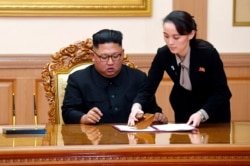South Korean police on Friday prevented a Christian activist group from sending aid and Bibles to North Korea, the latest evidence Seoul intends to prevent cross-border distributions that have angered Pyongyang.
Voice of the Martyrs Korea, a Seoul-based nongovernmental organization, had planned to float about 500 bottles — filled with rice, vitamins and Bibles — into the North from South Korea's western coast.
The activists were met by about two dozen local police officers, unidentified plainclothes officials, and local residents, who blocked a road near the intended launch site.
A day earlier, North Korea lashed out at conservative activists who for years have floated giant balloons filled with anti-Pyongyang leaflets across the border.
Kim Yo Jong, the powerful sister of North Korean leader Kim Jong Un, said North Korean defectors often involved in such activities are "riff-raffs," "human scum" and "mongrel dogs."
Unless Seoul prevents the launches, she said, North Korea could scrap an inter-Korean agreement to reduce military tensions, and it would completely withdraw from other cooperation arrangements.
Within hours, South Korea's left-leaning government, which desperately wants to improve ties with the North, said it would push for legislation to ban the launches.
The announcement raised concerns about violations of freedom of expression. Many also accused South Korea of being too accommodating to the North.
"It's surprising to hear the South Korean government sound so compliant to Pyongyang immediately after Kim Yo Jong issued threats to Seoul and cast aspersions on defector and human rights groups," said Leif-Eric Easley, a professor of international studies at Ewha Womans University in Seoul.
"[South Korean] President Moon [Jae-in]'s pro-engagement party may control the National Assembly, but legislation to effectively restrict freedom of expression in order to protect the Kim regime from embarrassment would be met with a conservative backlash domestically and criticism from human rights NGOs internationally," he added.
Both conservative and liberal South Korean governments have at times blocked activists from sending provocative leaflets into the North.
The materials often criticize North Korea's human rights record and sometimes include items of value, such as dollar bills or USB flash drives loaded with South Korean dramas.
Usually, officials have cited national security considerations to prohibit the launches. In 2014, North Korean border guards tried to shoot down some of the balloons, resulting in an exchange of gunfire with the South.
Mixed messages
But South Korean officials this week have given varying justifications for their opposition. The leaflet distribution, they said, not only causes tensions but also creates environmental pollution and upsets local residents.
They also have cited a 2018 inter-Korean agreement in which both sides agreed to stop tension-causing activities, including distribution of leaflets, along their border area.
The police who blocked Friday's launch cited objections from locals, who said they were concerned the move could heighten inter-Korean tensions.
"They were stopping the launch on the grounds that the property owner changed his mind and no longer wanted to permit access," said Pastor Eric Foley, CEO of Voice of the Martyrs Korea.
It is not clear how the locals knew to show up with police, since the group had not publicized their activities ahead of time. However, Foley said he notified authorities the night before of his intended launch.
The Voice of the Martyrs Korea did not intend to launch balloons. Instead, the NGO planned to toss plastic bottles into the water, allowing sea currents to carry the items into the North.
The group's bottles are viewed as less provocative than the actions of many groups, since they do not contain any anti-North Korea materials. Foley concedes, though, North Koreans could be punished if caught in possession of a Bible.
North Korea's constitution in theory guarantees freedom of religion. But in reality, all religious activity is tightly regulated, and religious activities outside of state control are treated as a national security threat.
Inter-Korean tension
Foley and other activists say they have no plans to stop the launches. He did say he was concerned because this is the first time one of his bottle launches had been blocked.
It is not clear what type of activities South Korea's government intends to outlaw or what the punishment would be for violating the rules.
The Moon government has long discouraged actions that create inter-Korean tensions, especially as Seoul's outreach to Pyongyang has become endangered.
The leaders of North and South Korea held three summits in 2018, signing a series of statements meant to decrease tension and expand cooperation.
But progress on implementing the agreements has stalled, in large part because of the lack of progress in North Korea's nuclear talks with the United States.
In recent months, North Korea has escalated its verbal attacks on the South, accusing Seoul of prioritizing its relationship with Washington over Pyongyang.






